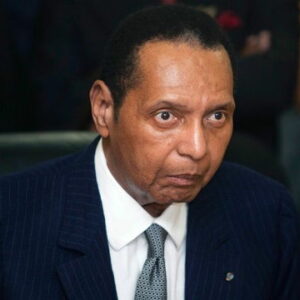Jean Claude Duvalier was the son of a cruel Haitian king who only served to worsen the country’s situation. He followed in his father’s footsteps and ruled the country dictatorially. This president, unlike his father, did not appear to be as horrible and had done some good for the country and its people. During his fifteen years as president, he instituted some measures aimed at improving the lives of Haitians. His rules were less stringent than those of the previous president. He reshuffled his cabinet and relaxed press restrictions. However, his desire for monetary wealth drove him to utilize unscrupulous methods and misappropriate public resources. During his President, the US resumed releasing funding to provide relief to Haitian citizens, which had been suspended during his father’s presidency. This provided him with more opportunities to accumulate fortune. He could have been used as a puppet by other Duvaliers. Even though he did not want to be president, he was forced to do so after his father, the prior president, died. This could be one of the reasons for his lackluster political career. He was in exile for twenty-five years and died three years after returning to his homeland.
Childhood & Early Life
Jean was born on July 3, 1951, in Port-au-Prince, Haiti, to parents François Duvalier and Simone Ovide.
Some kidnappers tried to kidnap him and his sister when he was still in school, but the plan failed. Following that incident, he was isolated from the rest of the world and raised in secrecy.
‘Nouveau College Bird’ and ‘Saint-Louis de Gonzague’ were among his educational institutes.
He continued his legal studies at the Université d’Etat d’-Hati (University of Haiti).
Jean Duvalier’s Career
Following the death of his father, former President François Duvalier, in 1971, he inherited the role of President of Haiti while still a teenager. He was arguably appointed president without his consent.
When he took office as President, he was pressured by the US to make changes in Haiti and reform the administration, which had deteriorated during the time of the previous despotic president.
Jean had no choice but to make a few changes in the government. He did not, however, make significant adjustments that would allow Haiti to emerge from its totalitarian dictatorship.
Baby Doc, as Jean Claude was known, followed in his father Papa Doc’s footsteps like a shadow, making minor adjustments to the administration.
The opposition party was not accepted during his reign, and the legislature played no role. The legislature was a name-brand institution, with the president making all significant decisions.
The Duvalier family accumulated vast wealth through the ‘Régie du Tabac’ (Tobacco Administration), which had been established in Haiti years before. He is also accused of illegally using the tobacco monopoly account by including earnings from several other sources.
During his leadership, Haiti received foreign aid from a variety of countries, but none of it was used to benefit the Haitian people. Instead, Jean squandered these funds.
Several expatriates assembled in Cape St. Nicholas in 1978, and Jean’s government appeared to be at risk of annexation at the time. The military forces of Haiti, on the other hand, ruined the prospects.
Another group of ex-pats arrived on the island of Tortuga in Haiti in 1982, and Haiti was annexed once more, but these expatriates were detained and executed.
Unrest erupted in Haiti as a result of these attempted conquests, as well as the spread of swine flu and the HIV/AIDS virus. The ‘Eradication of Porcine Swine Fever and for the Development of Pig Raising’ had a significant impact on peasants who invested in pig farming (PEPPADEP).
In 1985, Haiti saw an insurrection, and Duvalier attempted to suppress it by lowering food prices, shutting down private radio stations, and so on. However, these approaches failed, and US President Ronald Reagan’s administration requested that Duvalier step down as President of Haiti and depart the nation.
He left Haiti and traveled to France on February 7, 1986, after a series of discussions and dramatic occurrences.
His application for refuge in France was denied by the French authorities during his exile.
He declared his intention to run for President of Haiti in the 2006 presidential elections as a candidate of the ‘National Unity Party’ while still in exile. However, he was unable to lead the race.
Jean’s Major Achievements
As President of Haiti, he reformed the administration by removing certain cabinet members and selecting new and younger ones. He also released certain political leaders who had been imprisoned under his father’s dictatorship, as well as gave the press more freedom.
Personal Life and Legacy
Jean-Claude married Michèle Bennett Pasquet on May 27, 1980, and the pair has two children, François Nicolas and Anya. After a few years, though, the couple divorced.
In 1984, Ernest Preeg, the US ambassador to Haiti, congratulated Jean Claude for his excellent presidency in sustaining the country’s stability.
He lived opulently in France, but his divorce in 1993 cost him a fortune.
During his exile in France, he faced numerous problems, including accusations that he was unlawful and corrupt.
Jean Claude Duvalier was rated among the ‘World’s Most Corrupt Leaders’ in the 2004 ‘Global Transparency Report.’
René Préval, the President of Haiti, said in 2007 that Jean Claude was free to return to his homeland, but that he might face prosecution.
After a twenty-five-year absence, this exiled politician returned to his homeland in January 2011.
On the 4th of October 2014, Haiti’s President passed away.
He became the world’s youngest president when he was appointed President of Haiti at the age of nineteen.
Estimated Net worth
Jean-Claude Duvalier is one of the wealthiest and most well-known politicians. Jean-Claude Duvalier’s net worth is estimated to be $1.5 million, according to Wikipedia, Forbes, and Business Insider.


